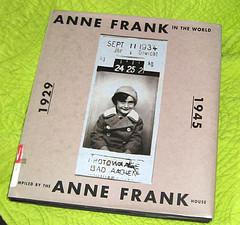The Netherlands has a complex legacy when it comes to World War II. Unlike the Allied nations that were in a clear position to deem themselves WWII victors after Germany was divided up, as a territory occupied from the get go, the Dutch never had that privilege. The Netherlands was home to not only the Dutch Resistance, but also many, many other brave men and women assisting Allied troops in any clandestine way they could or hiding Jews even as such actions threatened to earn them a trip to one of Nazi Germany's many death camps. At the same time, the Netherlands was also the birthplace of over 20,000 volunteers to the SS forces of the Wehrmacht and of many civilians who were untroubled by the forced deportations of their Jewish compatriots. The story of Anne Frank, perhaps more than any other in modern culture, exemplifies the complexity of the role of the Dutch during World War II: from the brave souls who hid Anne and her family in their attic for many years at a considerable risk to themselves, to those that finally ratted Anne's family out to the Nazis.

Anne Frank in the World (Photo credit: elycefeliz)
It is easy to see why the War and the legacy it had for the Dutch can still present contentious issues. Last year alone there were two major controversies with regards to Remembrance Day (which in the Netherlands occurs on May 4th and celebrates the deaths of both Dutch and foreign men and women in WWII as well as previous and subsequent wars). One such controversy involved a fifteen year old boy writing a prize-winning poem about his uncle who had voluntarily joined the SS and later ended up dying on the Eastern Front. Although at first asked to read his poem out at the national Remembrance Day celebrations, certain organizations (including a group representing Auschwitz survivors) immediately threatened to boycott the affair if the reading went ahead. Amidst the media storm that followed, the poetry reading was eliminated from the ceremonies in spite of the fact that in no way was the poem glorifying the death of Auke de Leeuw’s uncle, but rather focused on the boy coming to terms with the lives of his indirect ancestors (the same uncle also had several siblings who were members of the Dutch Resistance). A touching poem (at least in translation), but whether reading it out loud at such an occasion was a good idea, it is hard to tell.
This boundary between victims and the traditional image of the ‘bad guys’ was also explored in the second major controversy to rock both last year’s and now this year’s Remembrance Day celebrations. The town of Bronckhorst in Gelderland is one of the few towns in the Netherlands that is home to both German and Dutch WWII graves, in the nearby community cemetery of Vorden. In 2012, the townfolk decided that during the Remembrance Day celebrations that year they would commemorate the graves of both the Allied and the German servicemen. Although the courts shot this request down at the last minute, the town has subsequently won their appeal as long as they do it “with care.” As a result, on Remembrance Day 2013 the town will be commemorating the deaths of the German soldiers that likely occupied their town along with those Allied soldiers and Resistance members that fought them. The town plans on having an alderman walk along the German graves to commemorate.
Whether this is the embodiment of “political correctness gone mad!” or of a community that has finally come to terms with its past and forgiven those that sinned against them is not for me to say, although I sincerely hope it is the latter. Yet, even as a descendant of those who fought for both the Western and Eastern Allies, I am finding it supremely hard to feel anger for the people of Bronckhorst even if they are doing it solely for the media attention or PR reasons as some say they are. While we should never allow society to commemorate the deeds of Nazis, if a once German-occupied community wants to commemorate in their small way (and it really does seem like barely a token, in no way a celebration) all the WWII gravesites instead of just some, that should be their right… But that is my personal opinion. Take part in the Bronckhorst Remembrance Day celebrations for yourself and be the judge as to whether you think this was a good idea.

© 2013, Amsterdam City Tours Blog. All rights reserved. On republishing any part of this post, you must provide a link back to this original post

